Unit 7 Lesson 38 Hobbies Are Fun! 课件 (共21张PPT)2024-2025学年英语冀教版八年级上册
文档属性
| 名称 | Unit 7 Lesson 38 Hobbies Are Fun! 课件 (共21张PPT)2024-2025学年英语冀教版八年级上册 |

|
|
| 格式 | pptx | ||
| 文件大小 | 52.7MB | ||
| 资源类型 | 教案 | ||
| 版本资源 | 冀教版 | ||
| 科目 | 英语 | ||
| 更新时间 | 2024-09-17 00:00:00 | ||
图片预览

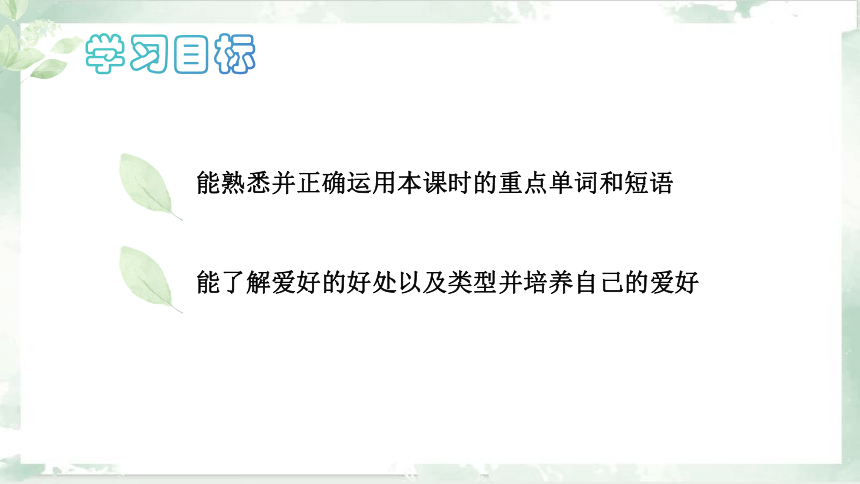

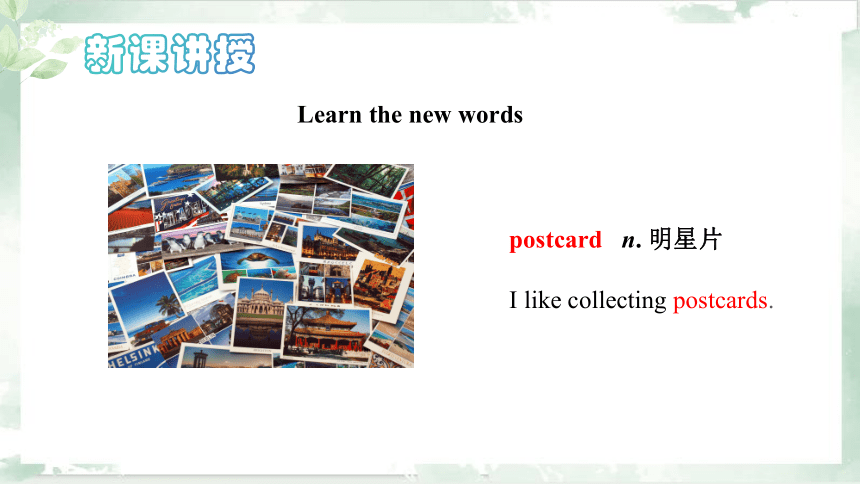
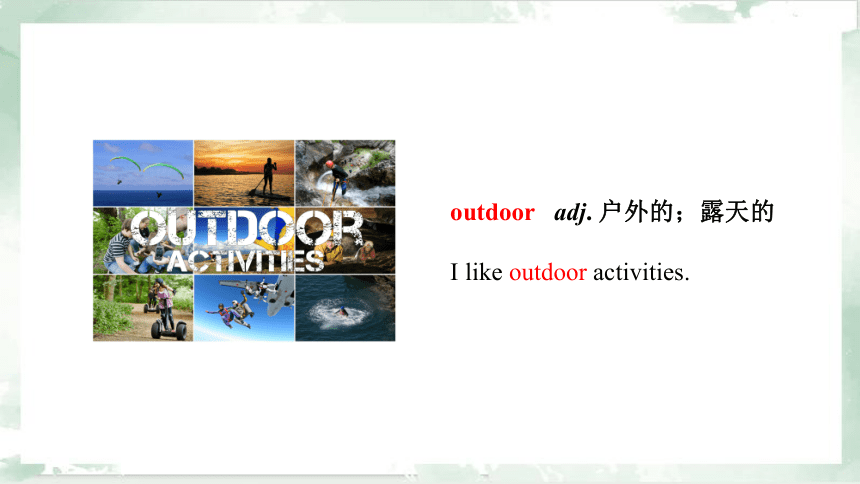
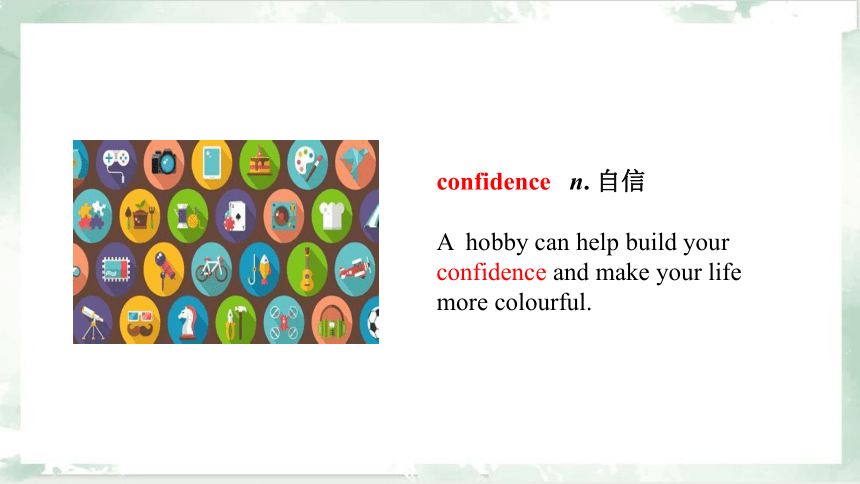
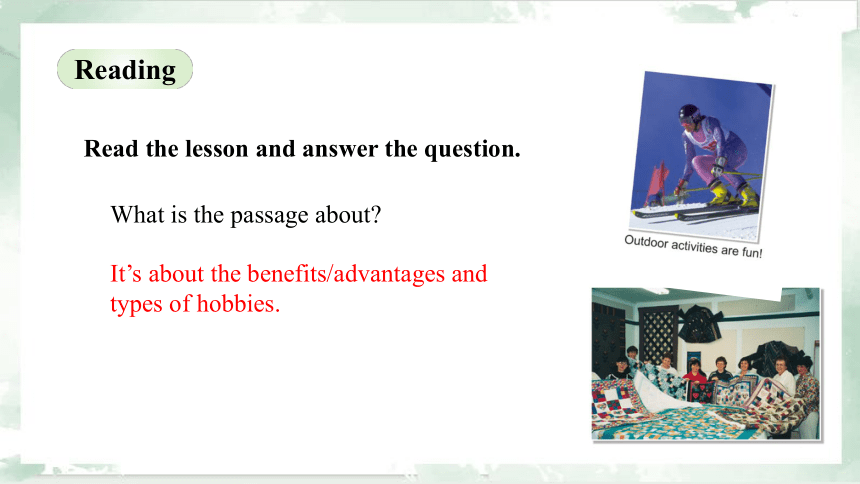
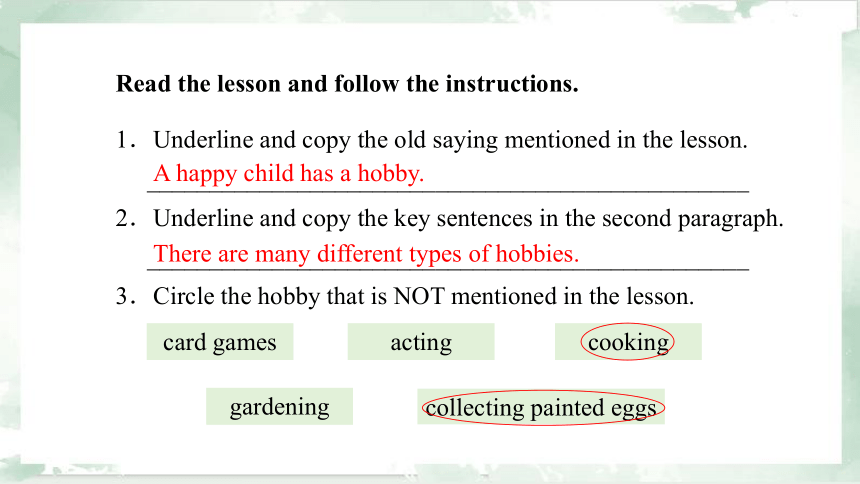
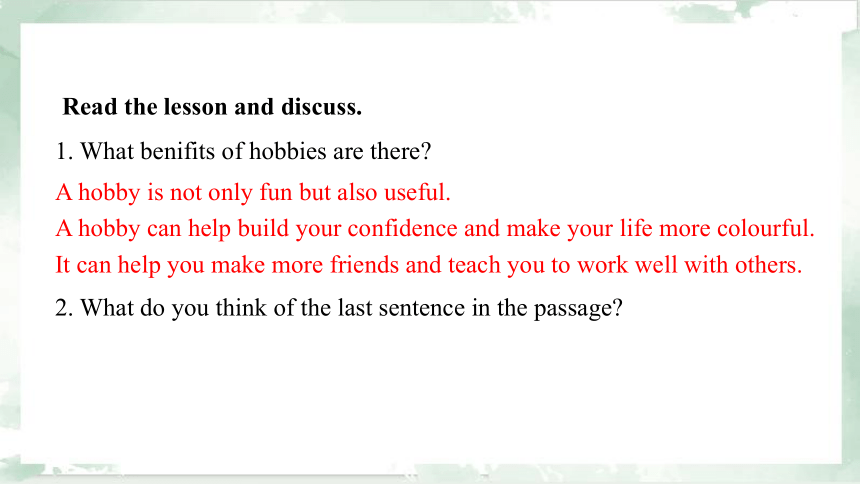
文档简介
(共21张PPT)
Unit 7
Enjoy Your Hobby
Lesson 38 Hobbies Are Fun!
学习目标
能熟悉并正确运用本课时的重点单词和短语
能了解爱好的好处以及类型并培养自己的爱好
1. What types of hobbies can you think of?
2. What new hobby do you like Why
Free talk
Learn the new words
postcard n. 明星片
I like collecting postcards.
新课讲授
outdoor adj. 户外的;露天的
I like outdoor activities.
confidence n. 自信
A hobby can help build your confidence and make your life more colourful.
Read the lesson and answer the question.
What is the passage about
It’s about the benefits/advantages and types of hobbies.
Reading
cooking
acting
collecting painted eggs
1.Underline and copy the old saying mentioned in the lesson.
________________________________________________
2.Underline and copy the key sentences in the second paragraph.
________________________________________________
3.Circle the hobby that is NOT mentioned in the lesson.
A happy child has a hobby.
There are many different types of hobbies.
Read the lesson and follow the instructions.
card games
gardening
Read the lesson and discuss.
1. What benifits of hobbies are there
2. What do you think of the last sentence in the passage
A hobby is not only fun but also useful.
A hobby can help build your confidence and make your life more colourful.
It can help you make more friends and teach you to work well with others.
Work in pairs. Read the lesson again and organize the hobbies
into the following groups.
toy car collection;
postcard collection
gardening;
travelling;
skiing
card games;
chess;
drawing;
dancing;
acting; singing
Dig In
There are many sayings about hobbies:
All work and no play makes Jack a dull boy.
Happy is the man who is living by his hobby.
If you have time after work for your hobby, you are lucky. But if work itself is a hobby for you, you are luckiest.
Do you know any similar sayings in Chinese
Read and understand
Listen and repeat.
Post-reading
Listen to the statements and match the names with the hobbies.
Jim
Wang Lin
Jack
Kate
Sun Yang
I like playing chess in my spare time.
I enjoy collecting sports cards.
I’m interested in learning about my family history.
I really love singing. Singing is a big part of my life.
When I have free time, I read story books.
1. What types of hobbies can you think of
你能想起哪些类型的爱好?
(1)think of 意为“想起;考虑”。常用一些副词来修饰。
(2)think much/a lot/highly/well of... 意为“对……评价高/好”。
(3)think of 后接名词、代词或动名词作宾语。
e.g.
His boss thinks highly of him. 他的老板对他评价很高。
Language points
2. A hobby is not only fun but also useful.
爱好不仅有趣而且有用。
(1)not only... but also... 不但……而且……,用于连接两个表示并列关系的成分,着重强调后者,其中的also有时可以省略。
(2)当它连接并列的主语时,谓语动词与后面一个主语在人称和数上保持一致,即遵循“就近原则”。
e.g.
She can not only play the piano but write the music.
她不仅会弹钢琴,而且还会作曲。
3. A hobby can help build your confidence and make your life
more colourful.
爱好能帮助建立自信让生活更加多姿多彩。
help v. 意为“帮助;援助”。
help sb.with sth. 意为“在某方面帮助某人”。
help 后的动词不定式既可带to,也可省略to。
e.g.
He often helps me (to) clean the room. 他经常帮我打扫房间。
Can you help me with my English 你能帮我学英语吗?
4. It’s never too late to learn something new.
活到老学到老。
something new 意为“新事物”。
something 用于肯定句;anything 用于否定句或疑问句。
形容词修饰不定代词,把形容词置于不定代词之后。
e.g.
There is something under the table. 桌子底下有东西。
Is there anything in the bag 那个包里有东西吗?
5. People usually take up their first hobby when they are kids, but
hobbies are fun for all ages.
人们通常在他们还是孩子的时候就开始了他们的第一个爱好,但是
爱好对所有年龄的人来说都是有趣的。
take up 意为“开始从事;占据”。
e.g.
She took up the voluntary work after graduation.
毕业后她开始从事志愿工作。
The work took up all my time.
这个工作占据了我全部的时间。
First retell to yourself and then to the group members.
For example:
“A happy child has a hobby.” That’s an old saying, and it’s true. A hobby is not only fun but also useful.
...
Retell
Share your hobby
Introduce your hobby and its benefits.
Share in group and then in class.
Words and phrases:
postcard, not only... but also..., take up
Key sentences:
1. What types of hobbies can you think of
2. A hobby is not only fun but also useful.
3. A hobby can help build your confidence and make your life more colourful.
4. It’s never too late to learn something new.
5. People usually take up their first hobby when they are kids, but hobbies are fun for all ages.
课堂总结
Unit 7
Enjoy Your Hobby
Lesson 38 Hobbies Are Fun!
学习目标
能熟悉并正确运用本课时的重点单词和短语
能了解爱好的好处以及类型并培养自己的爱好
1. What types of hobbies can you think of?
2. What new hobby do you like Why
Free talk
Learn the new words
postcard n. 明星片
I like collecting postcards.
新课讲授
outdoor adj. 户外的;露天的
I like outdoor activities.
confidence n. 自信
A hobby can help build your confidence and make your life more colourful.
Read the lesson and answer the question.
What is the passage about
It’s about the benefits/advantages and types of hobbies.
Reading
cooking
acting
collecting painted eggs
1.Underline and copy the old saying mentioned in the lesson.
________________________________________________
2.Underline and copy the key sentences in the second paragraph.
________________________________________________
3.Circle the hobby that is NOT mentioned in the lesson.
A happy child has a hobby.
There are many different types of hobbies.
Read the lesson and follow the instructions.
card games
gardening
Read the lesson and discuss.
1. What benifits of hobbies are there
2. What do you think of the last sentence in the passage
A hobby is not only fun but also useful.
A hobby can help build your confidence and make your life more colourful.
It can help you make more friends and teach you to work well with others.
Work in pairs. Read the lesson again and organize the hobbies
into the following groups.
toy car collection;
postcard collection
gardening;
travelling;
skiing
card games;
chess;
drawing;
dancing;
acting; singing
Dig In
There are many sayings about hobbies:
All work and no play makes Jack a dull boy.
Happy is the man who is living by his hobby.
If you have time after work for your hobby, you are lucky. But if work itself is a hobby for you, you are luckiest.
Do you know any similar sayings in Chinese
Read and understand
Listen and repeat.
Post-reading
Listen to the statements and match the names with the hobbies.
Jim
Wang Lin
Jack
Kate
Sun Yang
I like playing chess in my spare time.
I enjoy collecting sports cards.
I’m interested in learning about my family history.
I really love singing. Singing is a big part of my life.
When I have free time, I read story books.
1. What types of hobbies can you think of
你能想起哪些类型的爱好?
(1)think of 意为“想起;考虑”。常用一些副词来修饰。
(2)think much/a lot/highly/well of... 意为“对……评价高/好”。
(3)think of 后接名词、代词或动名词作宾语。
e.g.
His boss thinks highly of him. 他的老板对他评价很高。
Language points
2. A hobby is not only fun but also useful.
爱好不仅有趣而且有用。
(1)not only... but also... 不但……而且……,用于连接两个表示并列关系的成分,着重强调后者,其中的also有时可以省略。
(2)当它连接并列的主语时,谓语动词与后面一个主语在人称和数上保持一致,即遵循“就近原则”。
e.g.
She can not only play the piano but write the music.
她不仅会弹钢琴,而且还会作曲。
3. A hobby can help build your confidence and make your life
more colourful.
爱好能帮助建立自信让生活更加多姿多彩。
help v. 意为“帮助;援助”。
help sb.with sth. 意为“在某方面帮助某人”。
help 后的动词不定式既可带to,也可省略to。
e.g.
He often helps me (to) clean the room. 他经常帮我打扫房间。
Can you help me with my English 你能帮我学英语吗?
4. It’s never too late to learn something new.
活到老学到老。
something new 意为“新事物”。
something 用于肯定句;anything 用于否定句或疑问句。
形容词修饰不定代词,把形容词置于不定代词之后。
e.g.
There is something under the table. 桌子底下有东西。
Is there anything in the bag 那个包里有东西吗?
5. People usually take up their first hobby when they are kids, but
hobbies are fun for all ages.
人们通常在他们还是孩子的时候就开始了他们的第一个爱好,但是
爱好对所有年龄的人来说都是有趣的。
take up 意为“开始从事;占据”。
e.g.
She took up the voluntary work after graduation.
毕业后她开始从事志愿工作。
The work took up all my time.
这个工作占据了我全部的时间。
First retell to yourself and then to the group members.
For example:
“A happy child has a hobby.” That’s an old saying, and it’s true. A hobby is not only fun but also useful.
...
Retell
Share your hobby
Introduce your hobby and its benefits.
Share in group and then in class.
Words and phrases:
postcard, not only... but also..., take up
Key sentences:
1. What types of hobbies can you think of
2. A hobby is not only fun but also useful.
3. A hobby can help build your confidence and make your life more colourful.
4. It’s never too late to learn something new.
5. People usually take up their first hobby when they are kids, but hobbies are fun for all ages.
课堂总结
同课章节目录
- Unit 1 Me and My Class
- Lesson 1 Back to School!
- Lesson 2 Many Faces, One Picture
- Lesson 3 Getting to Know You!
- Lesson 4 Best Friends
- Lesson 5 Meet Ms. Liu
- Lesson 6 Jenny's Week
- Unit 2 My Favourite School Subject
- Lesson 7 Don't Be Late for Class!
- Lesson 8 E-mail Helpers!
- Lesson 9 I Don't Want to Miss Geography !
- Lesson 10 Looking for Lisa
- Lesson 11 Lily Learns about China !
- Lesson 12 Karen's Hair Stood Up!
- Unit Review
- Unit 3 Families Celebrate Togethe
- Lesson 13 I Love Autumn
- Lesson 14 Happy Memories
- Lesson 15 A Present for Li Ming!
- Lesson 16 Happy Thanksgiving!
- Lesson 17 Presents from Canada!
- Lesson 18 Li Ming's Birthday
- Unit Review
- Unit 4 My Neighbourhood
- Lesson 19 The Best Neighourhood
- Lesson 20 No Stopping!
- Lesson 21 Eat a Donut and Turn Right
- Lesson 22 I Like My Neighbourhood
- Lesson 23 People in My Neighbourhood
- Lesson 24 I Need a Map!
- Unit Review
- Unit 5 My Future
- Lesson 25 I Want to Be a Teacher!
- Lesson 26 What Will I Be ?
- Lesson 27 What's Your Advice?
- Lesson 28 Rich or Poor? It Doesn't Matter!
- Lesson 29 Our Ambitions and Dreams
- Lesson 30 A Famous Friend?
- Unit Review
- Unit 6 Go With Transportation !
- Lesson 31 How Do You Travel ?
- Lesson 32 Trains Go Faster !
- Lesson 33 Life on Wheels
- Lesson 34 Flying Donuts
- Lesson 35 Future Transportation
- Lesson 36 Clean Cars ?
- Unit Review
- Unit 7 Enjoy Your Hobby
- Lesson 37 What's Your Hobby ?
- Lesson 38 Hobbies Are Fun!
- Lesson 39 Danny's Hobby
- Lesson 40 What's Paul's Hobby?
- Lesson 41 Show and Tell!
- Lesson 42 The New Club
- Unit Review
- Unit 8 Celebrating Me
- Lesson 43 What Makes You Unique?
- Lesson 44 Georgia Plays Basketball
- Lesson 45 Be Yourself !
- Lesson 46 My Dream
- Lesson 47 I Made It !
- Lesson 48 Li Ming's Report
- Unit Review
